ILS520 Instrument Landing System(ILS)
型号: ILS520(LLZ521,GP522)
描述: Instrument Landing System(ILS) provides guidance information for airport approach and landing flight to align with runway center line and a 3°glide angle.
一、Business
"Bright Aviation" provides equipment supply, installation and commissioning, technical guidance, flight check ground commissioning, panel repair, factory training, after-sales service, technical consultation, spare parts support, equipment failure repair, optimization adjustment and periodic patrol inspection and other turnkey projects.
二、Overview
1.Instrument Landing System(ILS) provides guidance information for airport approach and landing flight to align with runway center line and a 3°glide angle.
2.The equipment consists of LLZ521 Localizer, GP522 Glide-Path and remote controller.
3.Provide the most advanced technology and the most reasonable system architecture for the performance selection of ClassⅠ、Ⅱand Ⅲ equipment, and provide users with friendly Windows based The graphical software interface integrates, the latest technical features to reduce the number of system boards.
4.3U standard design reduces the cost of equipment installation, maintenance and logistics.Software design and certification meet the strict RTCA DO-178 B/278 standard.
三、Appearance
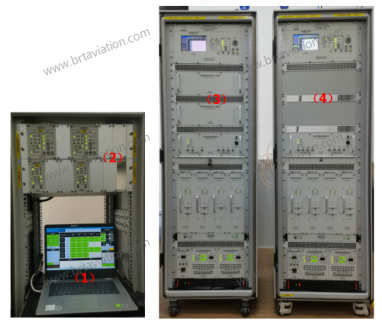
(1)Local or remote computer to access the RMM software operating system of the ILS equipment.
(2)Remote control (navigation duty room) and repeat display (tower).
(3)Localizer LLZ521 main cabinet.
(4)Glide-Path GP522 main cabinet.
四、LLZ521
(1)Electrical
1.Frequency Range:108 ~ 111.975 MHz.
2.Modulation Tones:90Hz and 150Hz(Single tone Modulation Depth 20%),1020Hz(Modulation Depth 10%).
3.CSB Power Output:5 ~ 30W(0.01W step adjustable).
4.SBO Power Output:0.1 ~ 1W(0.01W step adjustable).
5.Frequency Stability:±0.0001%.
6.Frequency Control:Synthesizer.
7.Coverage: Meet ICAO Annex 10.
8.Monitors:Dual Parallel And/Or configuration,and built-in-test generator.
9.RMM Software:Local or remote operation equipment software.
(2)Performance
1. Single and dual transmitter configurations (optional).
2. Single and dual frequency transmitter configurations (optional).
3. Localizer 12, 14, 16 and 20 unit LPDA antenna array (optional).
4. IP port of PC accesses RMM software of equipment.
5. Dual monitor configuration, cold or hot backup system configuration mode.
6. Automatic diagnosis of equipment failure, one click upload and download of equipment parameters.
7. One click printing of monitoring parameter report.
8. The IP port of the remote controller is connected to the ILS cabinet to monitor the working status of the equipment in real time.
9. The system can be upgraded from class I to class II and class III equipment performance at any time.
10. Comply with CAAC, 《aeronautical radio navigation aids Part 1:Technical requirements for Instrument landing system (ILS)》, MH/T- 4006.1-1998.
11. Comply with ICAO, Annex 10,《Aviation Telecommunications, Volume 1, Requirements for Radio Navigation equipment》.
12. Primary Power:110 ~ 220V AC±15%,45 ~ 63 Hz,single phase.
13. Standby Power:24V DC backup battery, working for at least 4 hours.
(3)Mechanical
1.Weight:220kg.
2.Size: 170 (H) * 60 (W) * 60 (D) cm, standard 35U cabinet.
(4)Environmental
1. Temperature: indoor -10°C ~ +50°C, outdoor -50°C ~ +70°C.
2. Relative humidity: indoor 0 ~ 95% (non condensing);outdoor 0 ~ 100% .
3. Altitude: 0 ~ 4500m MSL.
4. Work cycle: continuous unattended.
5.Wind speed conditions: the outdoor antenna can work normally when the wind speed is up to 161 km/h and the antenna icing is 1.5 cm thick.
(5)Main Cabinet
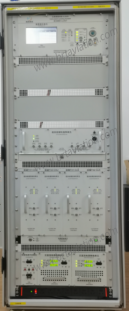
(6)12 Unit LLZ Antenna System
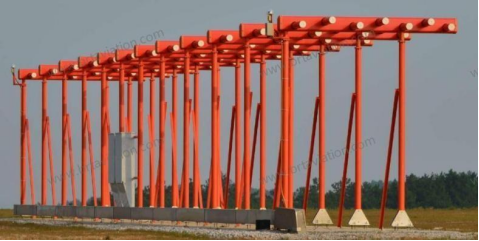
(7)Equipment List
No. | Name | Model | Qty/Unit | Remarks |
1 | LLZ Main Cabinet | LLZ521 | 1 Set | Including dual transmitter, dual monitor and dual power supply. |
2 | LLZ Antenna Dipole | / | 12 Unit | Including a set of 3m high antenna bracket, 12 transmitting cables, 12 monitoring cables, and 2 obstacle lights. |
3 | LLZ Antenna Distribution Unit | / | 1 Set | Used for 12 unit antenna system. |
4 | LLZ Monitoring Combine Unit | / | 1 Set | Used for 12 unit antenna system. |
5 | LLZ Near-Field Monitoring Antenna | / | 1 Set | Including a set of 1.5m high antenna support, a monitoring Cable and an obstacle light. |
6 | Other Accessories | / | 1 Set | / |
五、GP522
(1)Electrical
1.Frequency Range:328.6 ~ 335.4 MHz.
2.Modulation Tones:90Hz and 150Hz(Single tone Modulation Depth 40%).
3.COU CSB Power Output:2 ~ 10W(0.01W step adjustable).
4.COU SBO Power Output:0.1 ~ 1W(0.01W step adjustable).
5.CLR CSB Power Output:0.2 ~ 1W(0.01W step adjustable).
6.Frequency Stability:±0.0001%.
7.Frequency Control:Synthesizer.
8.Coverage:Meet ICAO Annex 10.
9.Monitors:Dual Parallel And/Or configuration, and built-in-test generator。
10.RMM software:Local or remote operation equipment software.
(2)Performance
1.Single and dual transmitter configurations (optional)。
2.Single and dual frequency transmitter configurations (optional)。
3.M-type capture effect LPDA antenna array。
4.IP port of PC accesses RMM software of equipment。
5.Dual monitor configuration, cold or hot backup system configuration mode.
6.Automatic diagnosis of equipment failure, one click upload and download of equipment parameters。
7.One click printing of monitoring parameter report。
8.The IP port of the remote controller is connected to the ILS cabinet to monitor the working status of the equipment in real time。
9.The system can be upgraded from classⅠ to class Ⅱ and class Ⅲ equipment performance at any time。
10. Comply with CAAC,《aeronautical radio navigation aids Part 1:Technical requirements for Instrument landing system (ILS)》, MH/T- 4006.1-1998.
11. Comply with ICAO, Annex 10,《Aviation Telecommunications, Volume 1, Requirements for Radio Navigation equipment》.
12. Primary Power:110 ~ 220V AC±15%,45 ~ 63 Hz,single phase.
13. Standby Power:24V DC backup battery, working for at least 4 hours.
(3)Mechanical
1. Weight:200kg.
2. Size:170 (H) * 60 (W) * 60 (D) cm, standard 35U cabinet.
(4)Environmental
1. Temperature: indoor -10°C ~ +50°C, outdoor -50°C ~ +70°C.
2. Relative humidity: indoor 0 ~ 95% (non condensing);outdoor 0 ~ 100% .
3. Altitude: 0 ~ 4500m MSL.
4. Work cycle: continuous unattended.
5.Wind speed conditions: the outdoor antenna can work normally when the wind speed is up to 161 km/h and the antenna icing is 1.5 cm thick.
(5)Main Cabinet
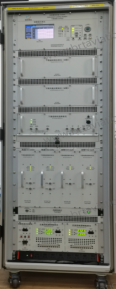
(6)M-type GP Antenna System
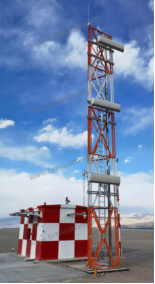
(7)Equipment List
No. | Name | Model | Qty/Unit | Remarks |
1 | GP Main Cabinet | GP522 | 1 Set | Including dual transmitter,dual monitor and dual power supply. |
2 | GP Antenna Dipole | / | 3 Unit | Including 1 set of 15m high GP tower support,3 transmitting cables,3 monitoring cables and 1 obstacle Light. |
3 | GP Antenna Distribution Unit | / | 1 Set | Used for M-type antenna system. |
4 | GP Monitoring Combine Unit | / | 1 Set | Used for M-type antenna system. |
5 | GP Near-Field Monitoring Antenna | / | 1 Set | Including a set of 5m high antenna support, a monitoring cable and an obstacle light. |
6 | Other Accessories | / | 1 Set | / |
六、Remote Control and Repeat Display Unit
(1)Electrical
1. The remote controller communicates with the ILS equipment through the Ethernet IP interface.
2. The remote controller communicates with the repeating display unit through RS-485 protocol.
3. Primary Power: 110 ~ 220V AC ± 15%, 45 ~ 63 Hz, single phase.
4. Standby Power:24V DC backup battery, working for at least 4 hours.
(2)Mechanical
1. Weight:4kg.
2. Size: 13.4 (H) * 60 (W) * 20 (D) cm, standard 3U chassis.
(3)Environmental
1. Temperature: indoor -10°C ~ +50°C.
2. Relative humidity: 0 ~ 95%.
3. Altitude: 0 ~ 4500m MSL.
(4)Equipment List
1. Remote Controller,1 set, 3U chassis.
2. Repeat Display Unit,1 set,3U chassis.
3. Transmission Equipment,1 set.
(5)Appearance
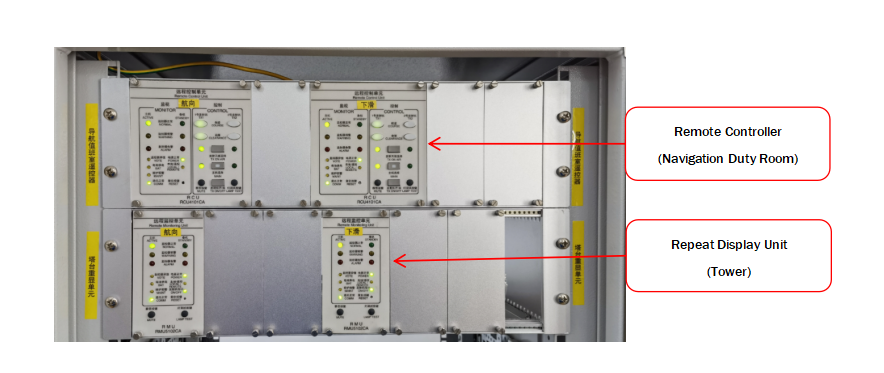
七、RMM Software
The RMM software interface provides Chinese and English operating languages to facilitate user operation and maintenance of equipment, as shown in the figure below.
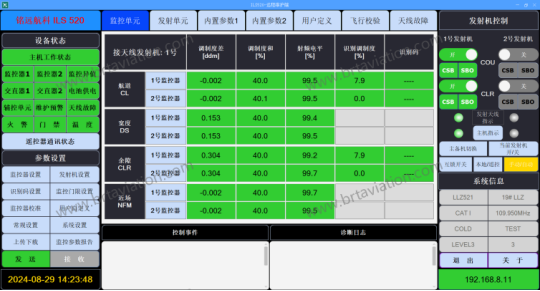
Localizer “monitoring unit”interface (Chinese)
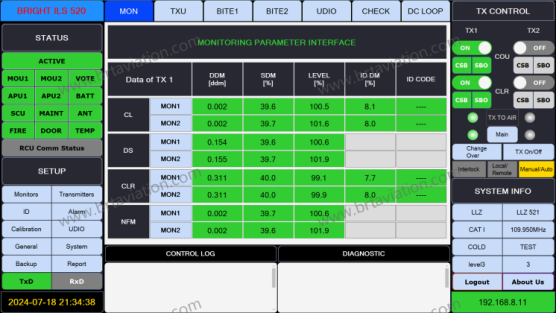
Localizer “monitoring unit” interface (English)
八、Certificate
(1)Radio Transmitting Equipment Type Approval Certificate
Radio Transmission Equipment Type Approval Certificate issued by the Radio Administration of the Ministry of Industry and Information Technology of China.
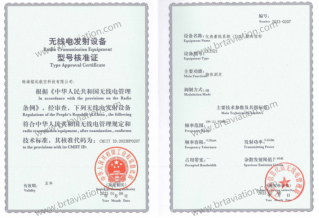
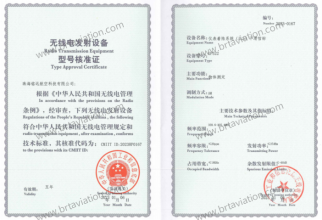
(2)EMC Environment Test Report
ILS520 equipment CNAS certification, electrostatic discharge immunity test, electrical fast transient burst immunity test, surge (impact) immunity test, voltage sag, short interruption and voltage change immunity test, electromagnetic compatibility environment test report.
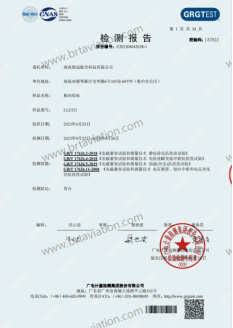
(3)Environmental Test Report
ILS520 equipment CNAS certification , damp heat test, low temperature test, high temperature test, low pressure test, salt spray test, vibration test, impact test, environmental test report.
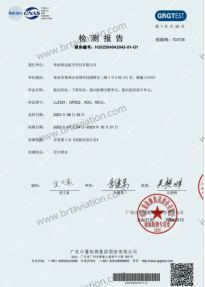
(4)Reliability Test Report
ILS520 equipment CNAS certification , 5000 hour reliability test report.
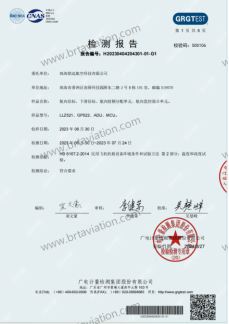
九、Standards
1. CAAC,《Aeronautical radio navigation aids,Part 1:Technical requirements for Instrument landing system (ILS)》, MH/T-4006.1-1998.
2. CAAC,《Electromagnetic environment requirements for aeronautical radio navigation stations 》, GB 6364-2013.
3. CAAC, 《Specification for aeronautical communication navigation and surveillance station siting criteria,Part 1: Navigation 》, MH/T 4003.1—2021.
4. CAAC,《Test Requirements for Aviation Radio Navigation equipment,Part 1: Instrument Landing System》, AC-115-TM-2013-01。
5.CAAC, 《China civil aviation instrument landing system classⅡoperation regulations》, CAAC order No. 57.
6. ICAO, Annex 10, Aviation Telecommunications, Volume 1, 《Requirements for Radio Navigation equipment》.
7. ICAO, Document 8071, Volume 3, 《Test Manual for Radio Navigation equipment》,(1972).
十、Comparison
Some technical indicators of ILS520 type ILS equipment are compared with ICAO Annex 10 and CAAC ILS equipment technical requirements, as follows.
No. | Technical Index Content | ICAO Annex 10 | CAAC | ILS520 Equipment |
1 | LLZ Carrier: Frequency Tolerance | ≤±0.0004% | ≤±0.0002% | ≤±0.0001% |
2 | LLZ(ClassⅠ) :Single Tones 90Hz and 150Hz Frequency Tolerance | ≤90Hz±2.5%; ≤150Hz±2.5% | ≤90Hz±1.5%; ≤150Hz±1.5% | ≤90Hz±0.5%; ≤150Hz±0.5% |
3 | GP Carrier: Frequency Tolerance | ≤±0.0004% | ≤±0.0002% | ≤±0.0001% |
4 | GP (ClassⅠ) :Single Tones 90Hz And 150Hz Frequency Tolerance | ≤90Hz±2.5%; ≤150Hz±2.5% | ≤90Hz±1.5%; ≤150Hz±1.5% | ≤90Hz±0.5%; ≤150Hz±0.5% |
Note: By comparing the results, some technical indicators of the ILS520 equipment are better than the technical standards of ICAO and CAAC.
 上一篇:没有了!
上一篇:没有了! 



.png)
 下一篇:
下一篇: